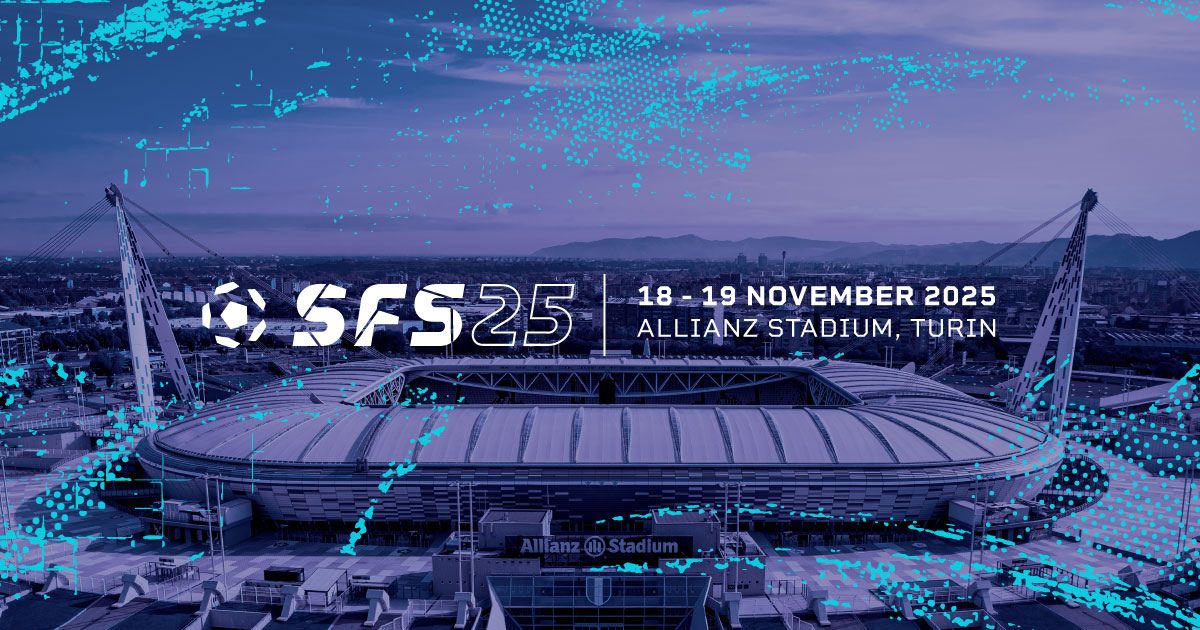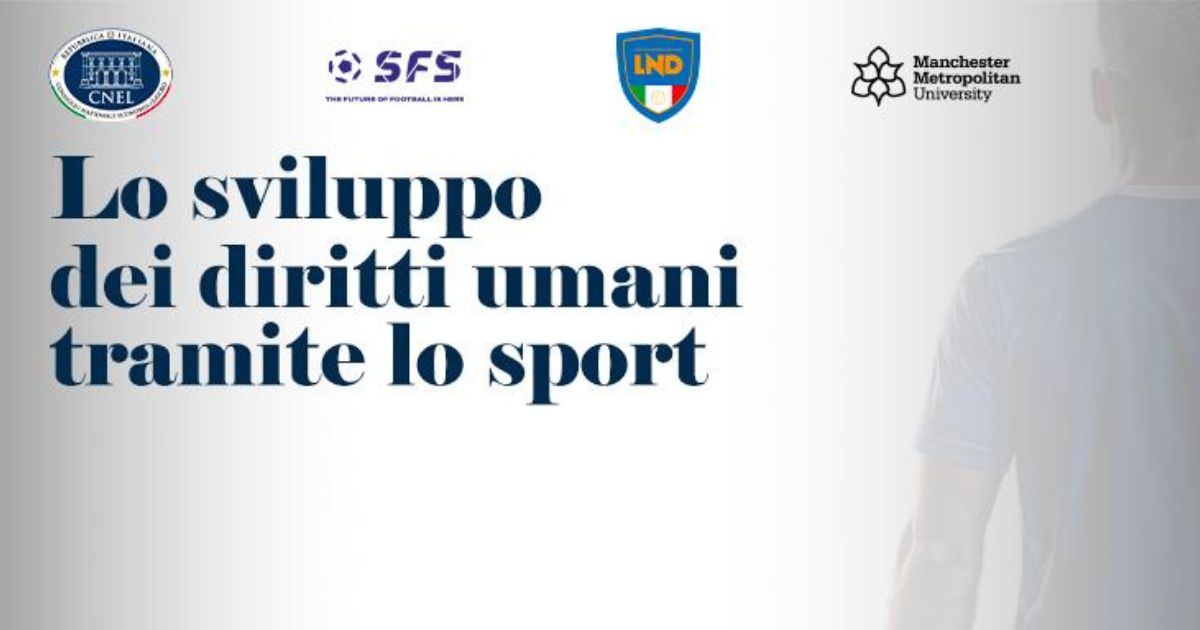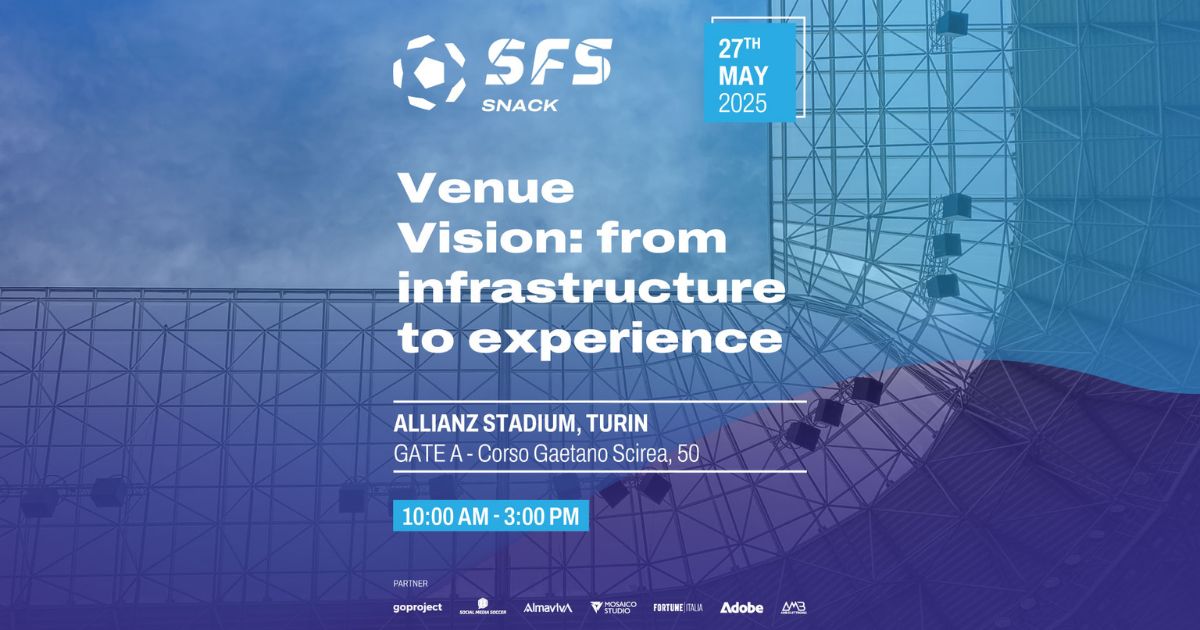The 8th edition of the SFS will take place on November 18–19, 2025, at the prestigious Allianz Stadium in Turin, marking an exciting new chapter for the international benchmark event in the football industry.
A symbolic venue for an edition that promises to be even more innovative, sustainable, and engaging, with a dynamic program of thematic panels, workshops, startup competitions, and awards ceremonies. The goal? To explore and shape the future of football through technological innovation, digital transformation, sustainability, inclusion, and new business models.
The summit will welcome over 150 prominent speakers from across the globe, including representatives from FIFA, UEFA, FIGC, Lega Serie A, European clubs, tech companies, executives, players, and sport industry innovators.
Key highlights will include SFS EXTRA TIME, the startup competition showcasing the most promising projects in sport, and the SFS Awards, celebrating excellence across the football ecosystem.
As Gianfilippo Valentini, CEO of SFS, stated: “Bringing the Summit to Turin—an iconic city for Italian football—is a major milestone in our growth journey, as we strengthen the event’s international impact”. This statement was shared by Massimo Tucci, Director of SFS, who added: “Consolidating the event’s role in Italy while further expanding its international reach, and in particular creating the best possible conditions to develop business opportunities among stakeholders, contributing to the growth and development of the entire sector.”
Finally, the Summit’s centrality on the international scene is also confirmed by the strategic collaboration with Lega Serie A, the event’s Global Partner. Luigi De Siervo, CEO of Lega Serie A, stated: “Participating in the event as a Global Partner allows us, once again, to be an active part of this growth process, to push our sport to be more modern, sustainable, and engaging for fans. The magnificent setting of the Allianz Stadium in Turin, a splendid example of a company-owned stadium, proves to be the perfect location to host this event and to represent the future of football, precisely because it is innovative and functional”.
📍 Want to join us? Discover all participation options and book your spot now at https://www.socialfootballsummit.com/en/ticket-sfs25/
SFS: the 8th edition heads to Allianz Stadium in Turin
The 8th edition of the SFS will take place on November 18–19, 2025, at the prestigious Allianz Stadium in Turin, marking an exciting new chapter for the international benchmark event in the football industry. A symbolic venue for an edition that promises to be even more innovative, sustainable, and engaging, with a dynamic program of thematic panels, workshops, startup competitions, and awards ceremonies. The goal? To explore and shape the future of football through technological innovation, digital transformation, sustainability, inclusion, and
LND and SFS: discussion on the topic of sports and human rights with regional representatives of LND’s CSR Area
Professor Marianna Pavan of Manchester Metropolitan University will also speak. A time for discussion to take stock of a season marked by social and inclusion projects that the Amateur League's CSR Area has promoted in synergy with its regional CSR contacts. On Monday, July 7 and Tuesday, July 8, at the"Carlo Tavecchio Room" at the LND headquarters in Rome, a meeting is scheduled to network through a shared daily commitment to sport and its function as a tool for guaranteeing human
Soccer between human intuition and artificial intelligence: comparing visions in meeting sponsored by LEAP Sport Academy
Speaking on July 18 in Lucca will be Federico Cherubini, CEO of Parma, coach Alessio Dionisi, Carlalberto Ludi, Sporting Director of Como, Pasquale Sensibile, Coordinator Scouting Team of Paris Saint-Germain, Gianfilippo Valentini, Founder of Social Football Summit and Manuel Vellutini, CEO of Akeron The world of soccer is increasingly influenced by data analytics, but what will be the future of soccer marketing? Can human intuition and algorithms be reconciled? These and other questions will be tried to be answered at a
“The Football Biz Formula”: a new video podcast series exploring innovation in football and sports business
In partnership with BuzzMyVideos, SFS is proud to launch a brand-new editorial project: The Football Biz Formula. A video podcast series designed to spark informal yet insightful conversations around the innovation driving the future of the sports and football industry. Hosted by Paola Marinone, Founder of BuzzMyVideos, the show will feature high-profile guests sharing their perspectives, experiences and visions aligned with the mission of SFS - Social Football Summit: shaping the future of football, today. 📺 The podcast will be available on YouTube.🎙️ Stay tuned — The Future of Football
YouTube and the Premier League: Turning Wins into Views
This is the first article in a reporting and analysis series on the YouTube performance of football properties, created in collaboration between SFS and BuzzMyVideos. In the first five months of 2025, the digital activity of Premier League clubs on YouTube has shown dynamics strongly influenced by sporting performances and seasonal events, with May confirming itself as a key month to understand the connection between on-field results and online visibility. At the top of the overall rankings is once again Liverpool, which has consistently led in both total views and new subscribers. In May alone, the Reds accounted for over 14%
SFS Renews Partnership with Adobe
SFS is pleased to announce the renewal of its partnership with Adobe for the 2025 edition of the event, taking place on November 18–19 in Rome. This strategic collaboration brings together technology, creativity, and innovation within the world of sport business. Adobe, a global leader in digital experience, will share its vision for the future of sports engagement. A key moment to explore how data and technology are transforming the way sports brands build value, emotional connections, and engagement with both fans and partners.
SFS Renews Media Partnership with Fortune Italia
SFS is pleased to announce the renewal of its media partnership with Fortune Italia for the 2025 edition of the event, taking place on November 18–19 in Rome. This strategic collaboration continues to grow year after year, reaffirming our shared commitment to delivering high-quality content, economic insights, and a forward-looking perspective on the evolution of the sports sector and football industry. Fortune Italia, a leading voice in the business and financial media landscape, will once again support the journey of SFS, helping foster dialogue between
SFS BRINGS THE FUTURE OF SPORTS VENUES TO TURIN
On May 27 at the Allianz Stadium in Turin, a full day of meetings, networking, and innovation focused on the future of sports venues A new stop of the SFS Snack format will take place at Allianz Stadium in Turin on May 27 with the event “Venue Vision: from infrastructure to experience”, dedicated to the evolution of sports venues as hubs of innovation, entertainment, and fan engagement. National and international experts will share their insights on how stadiums are becoming true experiential ecosystems, going far
SFS BRINGS THE INNOVATION OF SPORTS VENUES TO TURIN
On May 27th at the Allianz Stadium in Turin, a day of meetings, networking, and innovation for the future of venues SFS arrives in Turin with a new edition of the SFS Snack format, focused on one of the most current topics in the world of sports and entertainment: the evolution of sports venues. "Venue Vision: from infrastructure to experience" is the title of the event that will be held next May 27th at the Allianz Stadium in Turin, for a day
FIGC on the field with Komen Italy: a Blue Team for the Race for the Cure against breast cancer
This news was published, as news, on the official website of the FIGC. Also for the 2025 edition, scheduled to be held in Rome on May 11, the Federation will have its own booth with the trophies won by the national team in the Health, Sports and Wellness Village at Circus Maximus and will form its own team Also for the 2025 edition, scheduled for Sunday, May 11, in Rome, FIGC is joining the Race for the Cure, the signature












